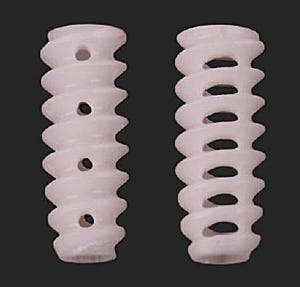A proprietary biomaterial processing technology developed by Proxy Biomedical (Galway, Ireland) reportedly boosts the strength of materials currently used to manufacture resorbable orthopedic implants by more than 100%. By increasing the strength and toughness of resorbable materials, Proxy Bio-XT could be a disruptive technology for implant design, enabling new applications that currently are not considered suitable for resorbable products, according to the company.
March 10, 2015
A proprietary biomaterial processing technology developed by Proxy Biomedical (Galway, Ireland) reportedly boosts the strength of materials currently used to manufacture resorbable orthopedic implants by more than 100%. By increasing the strength and toughness of resorbable materials, Proxy Bio-XT could be a disruptive technology for implant design, enabling new applications that currently are not considered suitable for resorbable products, according to the company.
|
Proxy Bio-XT suture anchor screws, modeled on |
The proprietary processing technology optimizes the material's microstructure, which is physically orientated and reinforced but not chemically changed. The performance gains are achieved by maximizing the material's inherent mechanical properties, which are compromised through standard processing techniques such as injection molding and extrusion, writes Proxy Biomedical in a white paper that can be downloaded (registration required) from its website.
In addition to opening up new application areas, Bio-XT technology allows the introduction of highly porous products that promote ingrowth and tissue regeneration and low-profile implants that use less material without compromising product strength, according to the company.
Bio-XT can be applied to any resorbable polymer or biocomposite blend, enabling its use for improvements to existing product families which leverage material grades that are well understood by the clinical and regulatory community.
"Resorbable implants present a number of clinical benefits for orthopedic applications but their relatively low inherent strength presents a barrier to new product design and limits the adoption of resorbables in new indications," said Kieran Moloney, Vice President of Engineering, Proxy Biomedical. "Proxy Bio-XT presents an excellent opportunity to substantially improve the performance of the resorbable implants that are currently on the market."
Proxy Biomedical provides biomaterials design, development and manufacturing services to global Tier 1 medical device companies. Company representatives will be available to discuss the new technology by appointment at the annual meeting of the American Academy of Orthopaedic Surgeons, which is held in Las Vegas, NV, from March 24 to 28, 2015.
About the Author(s)
You May Also Like





